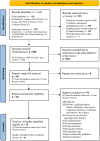A Systematic Review of Insulin Management Recommendations to Improve Glycemic Control and Reduce Hypoglycemic Events During Ramadan Fasting in Patients With Insulin-Requiring Type 2 Diabetes
- PMID: 35634376
- PMCID: PMC9135391
- DOI: 10.3389/fnut.2022.846600
A Systematic Review of Insulin Management Recommendations to Improve Glycemic Control and Reduce Hypoglycemic Events During Ramadan Fasting in Patients With Insulin-Requiring Type 2 Diabetes
Abstract
Background: Muslims with insulin-requiring type 2 diabetes are at high risk of hypo- and hyperglycemia while fasting during the month of Ramadan. Although a few reviews on diabetic management during Ramadan have been published, surveys reveal knowledge gaps remain among physicians.
Aim: This systematic review qualitatively analyzes what insulin dosing recommendations are likely to reduce hypoglycemic events and improve glycemic control during the Ramadan fasting for this high-risk group.
Methods: A comprehensive search in six databases and gray sources was performed from August 10, 2001, to August 10, 2021, for studies assessing which types of insulin and/or what dosing recommendations reduce hypoglycemic events and improve glycemic control during Ramadan. We excluded studies focusing mainly on oral antihyperglycemic medications, type 1 diabetes, persons with insulin pumps, and studies older than 20 years. Hypoglycemic event rates, pre-, and post-iftar blood glucose levels, overall average blood glucose, and hemoglobin A1c were analyzed, and a narrative synthesis was performed.
Results: Out of 1,101 collected articles, 14 eligible studies including 2,969 participants with an average age of 54.8 years, we found that insulin dose reduction may prevent hypoglycemia without causing subsequent hyperglycemia, and rapid-acting insulin analogs may improve post-iftar and overall blood glucose without incurring hypoglycemia.
Conclusions: Though initial findings are promising, more research is needed to confirm the benefits of insulin dose reduction, rapid-acting insulin analogs, and ultra-long-acting insulins.
Systematic review registration: https://www.crd.york.ac.uk/prospero/, identifier: CRD42021268943.
Keywords: Islam; hyperglycemia; hypoglycemia; insulin; type 2 diabetes.
Copyright © 2022 Kieu, Iles, Khan, Östlundh, Boyd and Faris.
Conflict of interest statement
The authors declare that the research was conducted in the absence of any commercial or financial relationships that could be construed as a potential conflict of interest.
Figures
References
-
- Diabetes Facts & Figures . International Diabetes Federation (2020). Available online at: https://www.idf.org/aboutdiabetes/what-is-diabetes/facts-figures.html (accessed November 25, 2021).
-
- Diabetes and Ramadan . International Diabetes Federation (2020). Available online at: https://www.idf.org/our-activities/education/diabetes-and-ramadan.html (accessed November 27, 2021).
-
- Salti I, Benard E, Detournay B, Bianchi-Biscay M, Le Brigand C, Voinet C, et al. . A population-based study of diabetes and its characteristics during the fasting month of Ramadan in 13 countries: results of the epidemiology of diabetes and Ramadan 1422/2001 (EPIDIAR) study. Diabetes Care. (2004) 27:2306–11. 10.2337/diacare.27.10.2306 - DOI - PubMed
-
- Diabetes and Ramadan: Practical Guidelines . International Diabetes Federation and the DAR International Alliance (2021). Available online at: https://www.daralliance.org/daralliance/idf-dar-practical-guidelines-2021/ (accessed November 27, 2021).
Publication types
LinkOut - more resources
Full Text Sources


